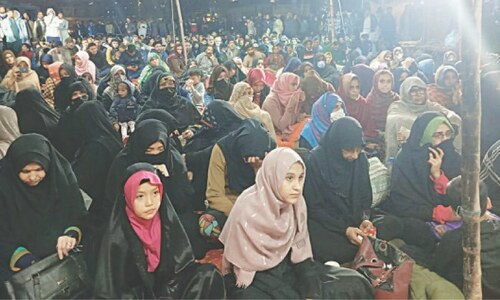DADU: Like all men and women of the fishing community dependent on Manchhar Lake for their livelihood, sixty-five-year-old widow Gahi Mallah wishes for the day when the lake’s highly-polluted water turns sweet and helps pull her family out of abject poverty.
After her husband Ghulam Hussain Mallah died of hepatitis C caused by consumption of the polluted lake water, Ms Mallah had to bear all responsibilities of her family and become its head. She had to face great challenges in the patriarchal rural society as she had to compete with men over scarce resources and opportunities.
Sitting in her makeshift house on the lake’s embankment in one of several villages around the freshwater resource, Maula Bux Mallah village, she told this reporter that she and her family faced the worst economic crisis these days.
She could not afford to buy even a few grammes of meat on Eid day for her family, not to speak of new clothes, shoes and essential food items to celebrate the festival in a respectable manner, she said.
She said that her two sons, 20-year-old Ashfaq and 23-year-old Buxal Mallah, and 30-year-old daughter Rubina Mallah caught three maunds (40 kilogrammes) of small fish daily and sold it for Rs150 per maund to a middleman and the meagre amount thus earned was not sufficient to buy even two square meals.
She said that once they had caught 20 maunds of big fish some 20 years ago when water in the lake used to be fresh but now the increasing pollution had caused the fish varieties to reduce from 60 to five in the lake. Only small fish were left, which they were catching and selling at the lowest rates, she said.
Ms Mallah said she had broken her arm when she fell from a boat (hora) while catching fish.
150 other fisher families living in the village shared the same economic conditions and waiting for the day when the lake’s water become clean and sweet.
When the lake water started turning brackish, fish varieties began to perish and survival of fishermen became hard. Most of the fishermen had turned to beggary in nearby towns to make both ends meet, she said.
There are 10,000 families living in the villages of Haji Malook, Gulshan Mallah, Gul Mohammad Mallah, Khairuddin Mallah, Haji Abdul Karim Mallah, Hoot Khan Mallah, Khan Mohammad Mallah, Qadir Bux Mallah, Girkano, Zero Mori, Khan Mohammad Mallah along the lake’s embankment and they pin their hopes on the proposed rehabilitation of the lake and availability of fresh water.
Ms Mallah said the old culture of Manchhar was dying and no one in the Sindh government was making efforts to protect the peculiar culture and lives of the fishermen.
She said the federal or Sindh government had not even made any efforts to throw fish seed in the lake to help increase income of the poor fishermen. The poor fishermen had been left at the mercy of God, she said.
Published in Dawn, August 19th, 2021













































Dear visitor, the comments section is undergoing an overhaul and will return soon.